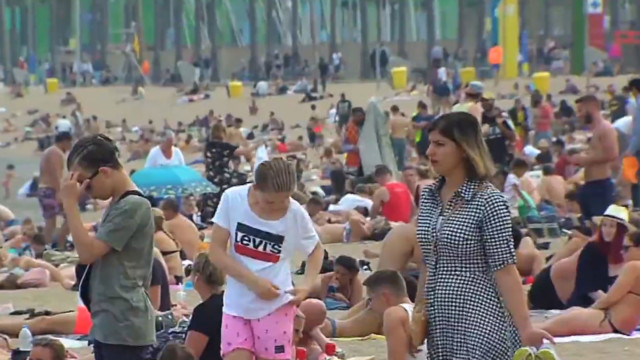Barcelona has become one of the most popular vacation spots in the Mediterranean. For residents — too popular. As its beaches and historic sites are overrun with visitors, it’s become one of the central fronts in the battle against “overtourism.”
CGTN’s Al Goodman reports.
It’s only mid-May, not even summer yet, but the beaches of Barcelona are already covered with tourists. Many northern Europeans have staked out their places at one of the Mediterranean’s most popular urban destinations. Visitors numbers topped 9 million annually in recent years, almost double the population of greater Barcelona. Even some of them have heard complaints about too many tourists in Barcelona.
“If I be from Barcelona I’d agree that there’s a bit too much tourism and Airbnbs and everything,” said Janni Taanila, a nurse from Finland
Barcelona already has restrictions on hotel growth, making it harder and more costly to open new ones or renovate existing rooms. But it’s not just Barcelona’s issue, say activists from 14 southern European destinations, including Venice and Lisbon, who met in Barcelona in May to join forces against so-called over-tourism.
“We are improving our scale of fight for regulation in tourism and for livability in our cities. Our quality of life must improve and not to get worse with tourism,” said Leonor Duarte, an activist from Lisbon.
But a spokesman for 3,000 Barcelona restaurants and bars says tourism is just fine.
“The message we can’t give is that Barcelona does not welcome tourism. To the contrary, Barcelona welcomes tourism,” said Rafael Pallerols with the Barcelona Restaurant Association.
Other visitors agree.
“I think there’s a lot of people here, but it’s all part of the fun, isn’t it?” said Bianca Lanario, an audiovisual project coordinator from Britain.
Some residents of a neighborhood near the beach don’t see it as fun. Their neighborhood has been a flashpoint of tension between tourists and residents. The past few summers, residents have come out to protest, banging pots and pans against the tourists who hold late night parties in the numerous holiday rentals in these buildings. That tension is expected again this summer
“They come back at 3 or 4 in the morning, play loud music and when you ask them to stop, you have problems,” said Jorge Bueno, a retired mechanic who has lived his whole live on the same street in Barcelona.
It took the city years to build up its tourism sector to this level. But now, it’s struggling with its success.
 CGTN America
CGTN America
